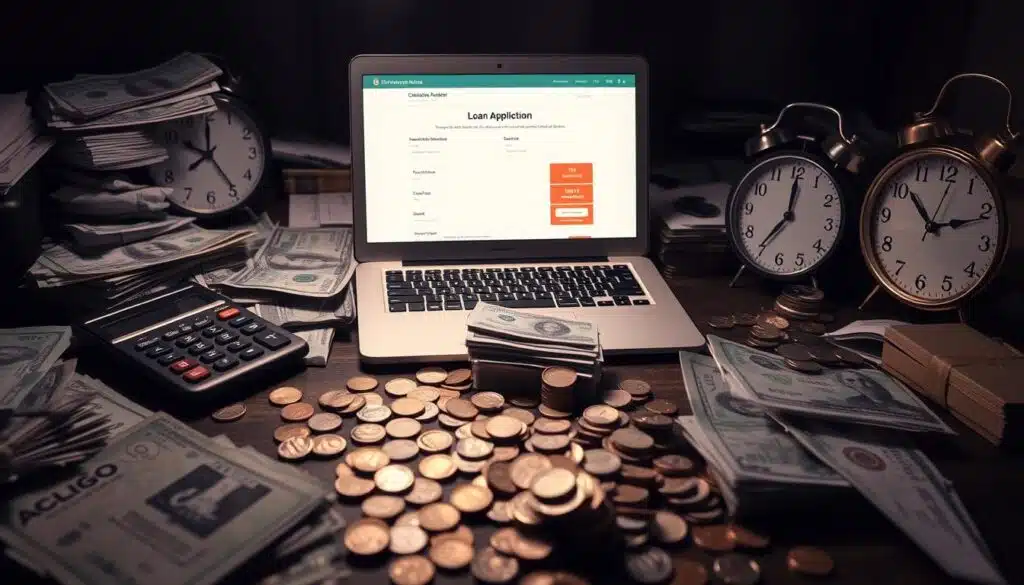Loan Emergency When unexpected expenses pop up, like medical bills or car repairs, emergency loans can offer a quick fix. These short-term loans are made for people who need money fast for sudden costs. Experts say you can get funds in one business day with some emergency loans, which is great for urgent needs. But, payday loans or car title loans might be your only choice if your credit doesn’t qualify you for other options.
Emergency loans are quick personal loans that you can get fast after approval. But, they might have high interest rates or fees. You can choose from personal loans, credit card cash advances, or payday loans, each with its own benefits and drawbacks. These include things like how easy they are to get, how fast you can get the money, the interest rates, and how you pay them back.
Key Takeaways
- Emergency loans can provide quick financial relief for unexpected expenses.
- Payday loans or car title loans may be the only option if you don’t qualify for other emergency loans.
- Emergency loans are usually unsecured personal loans with potentially higher interest rates and fees.
- Common emergency loan options include personal loans, credit card cash advances, and payday loans.
- Carefully consider the terms and conditions of any emergency loan before applying.
What is a Loan Emergency?
A loan emergency is when you face sudden financial problems that need quick help. These problems can come from unexpected medical bills, big car repairs, or urgent fixes for your home. If you’re not saving money, these emergencies can put you in a tough spot.
Types of Financial Emergencies
Some common reasons you might need an emergency loan include:
- Job loss or unexpected reduction in income
- Medical emergencies, such as unexpected medical bills or hospital stays
- Home repairs, such as a broken appliance or a leaky roof
- Car repairs, including unexpected breakdowns or accidents
- Natural disasters or other unforeseen events that lead to urgent expenses
When Do You Need Emergency Funds?
Financial emergencies can happen anytime and can be very stressful if you’re not prepared. They might need quick fixes for your home, car, or even medical bills. Having emergency funds can help you get through these tough times without more financial trouble.
| Emergency Situation | Average Cost |
|---|---|
| Medical Bills | $1,500 – $5,000 |
| Car Repairs | $500 – $2,000 |
| Home Repairs | $1,000 – $10,000 |
The table shows how quickly these unexpected costs can pile up. This makes it clear why having emergency funds is so important for handling financial emergencies and avoiding more financial stress.
Understanding Emergency Loans

When you face unexpected costs like medical bills, car repairs, or losing your job, emergency loans can be a big help. These loans include personal loans, payday loans, title loans, and credit card cash advances.
Personal loans are a common emergency loan that don’t need collateral. They have repayment terms from a few months to a few years. Payday loans and title loans are short-term loans with high interest rates and tough repayment rules.
It’s important to look at the loan terms, like interest rates, fees, and repayment terms, before choosing. This helps you make a choice that fits your financial future.
“Emergency loans can be a lifesaver when you’re faced with unexpected expenses, but it’s crucial to understand the different options and their implications before making a decision.”
Knowing about the different emergency loans helps you make a smart choice. It lets you handle your immediate needs without hurting your finances later.
| Loan Type | Interest Rates | Repayment Terms | Collateral Required |
|---|---|---|---|
| Personal Loans | 6% – 36% | 3 months to 7 years | No |
| Payday Loans | 400% – 780% | 2 to 4 weeks | No |
| Title Loans | 300% – 500% | 30 days | Yes (vehicle title) |
| Credit Card Cash Advances | 20% – 30% | Varies based on card terms | No |
How to Get an Emergency Loan
When you face a sudden financial crisis, you might need to act fast to get the money you need. Applying for an emergency loan can be a good option, but knowing the process and making smart choices is key. Let’s look at the steps to get an emergency loan that fits your situation.
- Determine Your Urgency: Figure out how serious your financial emergency is. Ask yourself if you really need a quick emergency loan or if borrowing from friends or family could work better.
- Compare Loan Options: Look into different lenders like online lenders, payday lenders, banks, and credit unions. Check their requirements, interest rates, repayment plans, and how fast they can give you money. Online lenders are usually the quickest, taking 1-7 business days. On the other hand, home equity loans and HELOCs can take up to 45 days.
- Get Prequalified: Many lenders let you prequalify to see if you’re eligible and what rates you might get without a hard credit check. This doesn’t affect your credit score. It helps you find the best lender for your finances.
- Complete the Application: After picking a lender, fill out the loan application with your personal and financial info. You might need to provide documents like pay stubs or bank statements to show you can pay back the loan.
- Wait for Approval and Funding: After you apply, the lender will check your info and decide. If they say yes, they’ll give you the loan terms, like the interest rate and repayment schedule. Once you agree, they’ll start the loan funding process, which usually takes 1-7 business days.
It’s very important to look over the repayment terms and interest rates carefully. Make sure the emergency loan fits your financial situation and goals. By understanding the process and looking at your options, you can find the best emergency loan for your needs.
loan emergency
When unexpected expenses or a financial crisis hit, an emergency loan can be a big help. These loans are short-term and can be personal loans, payday loans, title loans, or credit card cash advances. They give you quick cash for urgent needs.
A recent study found that people use emergency loans for things like medical bills, home repairs, or car problems. These short-term loans can be a quick fix in a crisis. But, it’s important to think about the terms and effects before you decide.
Emergency loans have good and bad sides. Knowing about the interest rates, repayment plans, and eligibility can help you make a smart choice. This way, you can pick the best option for your situation and goals.
“Emergency loans can provide a much-needed lifeline, but it’s important to weigh the costs and long-term implications before committing to this type of short-term financing.”
Emergency loans can be a big help in tough financial times. But, you should be careful and think it over well. Look at all your options and understand the risks and benefits. This way, you can make a choice that helps you now without hurting you later.
| Loan Type | Average Interest Rate | Typical Repayment Period | Eligibility Requirements |
|---|---|---|---|
| Personal Loan | 6-36% | 1-5 years | Good credit, stable income |
| Payday Loan | 300-500% | 2-4 weeks | Proof of income, active checking account |
| Title Loan | 100-300% | 1-6 months | Vehicle ownership, lien-free title |
| Credit Card Cash Advance | 20-30% | Repayment due with next card statement | Active credit card, available credit |
Emergency Loan Alternatives

When you’re facing a financial emergency, quick loans might seem like a good idea. But, they often come with high interest rates and fees that can trap you in debt. Luckily, there are other ways to get short-term financing without the long-term debt.
Payment Plans
One way to handle an emergency is to talk to the provider or creditor about a payment plan. This lets you pay off the expense over time, usually with better terms than an emergency loan. By working directly with them, you might get a payment plan that suits your budget.
Low-Interest Credit Cards
Getting a low-interest or 0% APR credit card can also help with unexpected costs. These cards often have lower interest rates during an introductory period. This makes them cheaper than high-interest emergency loans. Just remember to pay off the balance before the special offer ends.
Borrowing from Friends or Family
Asking friends or family for a short-term loan can be a good option, especially if they offer flexible repayment and low interest. But, make sure you have a clear agreement to avoid any problems or bad feelings.
Emergency loans might seem like a fast solution, but think about the long-term effects of high-interest debt. By looking into these alternatives, you can get the money you need without hurting your long-term finances.
Dealing with Bad Credit

People with bad or fair credit may find it hard to get an emergency loan. Lenders often look at your credit score to decide if you qualify and what terms you get. If your score is under 669, you might need to look at other options instead of traditional bank loans.
For those with bad credit, payday loans or title loans could be an option. These loans don’t check your credit but have very high interest rates. This makes them a risky choice that you should think about carefully.
Secured loans are another choice, using something valuable like a car or home as security. This might be an option for bad credit, but it’s risky. You could lose the collateral if you can’t pay back the loan.
Credit unions might be a better choice for those with less-than-perfect credit compared to banks. They usually have easier credit and income rules. This makes them more accessible for those in a financial emergency.
| Loan Option | Credit Check Required | Interest Rates | Collateral Needed |
|---|---|---|---|
| Payday Loans | No | Very High | No |
| Title Loans | No | Very High | Yes (Vehicle) |
| Secured Loans | Yes | Varies | Yes (Asset) |
| Credit Union Loans | Yes | Varies | No |
When you have bad credit, it’s key to look at all your options and know the risks and terms of each emergency loan. Research and compare the pros and cons to make a choice that suits your financial situation.
Where to Find Emergency Loans
When you’re hit with unexpected expenses, you might need money fast. Luckily, there are several places that offer emergency loans. These include online lenders, payday lenders, banks, and credit unions.
Online Lenders: Online lenders are a quick way to get an emergency loan. They can put money in your account in 1-7 business days. These lenders have a simple application process, making them great for those in a hurry.
Payday Lenders and Title Lenders: Payday lenders and title lenders can give you fast cash. But, their loans have high interest rates and fees. So, they’re not the best choice for borrowing over a long time.
Banks and Credit Unions: Banks and credit unions might offer emergency loans with better terms and conditions. But, they might take longer to process your application and give you the money.
It’s key to do your homework, read reviews, and understand the loan terms and conditions before applying. This way, you can make sure you’re getting a good deal for your situation.
“When facing a financial emergency, it’s crucial to explore all your options and choose a lender that can provide the funds you need quickly and with reasonable terms and conditions.”
Also Read : How Creditworthiness Affects Your Financial Opportunities?
Conclusion
Emergency loans can be a big help when you face sudden costs. But, it’s important to look closely at the terms and what they mean for your future. By comparing different lenders and loan types, you can find the best way to handle your urgent money needs. This way, you avoid getting stuck with high-interest debt.
Having an emergency fund can also cut down on the need for loans later on. It acts as a safety net for unexpected bills. Whether it’s a medical expense, car fix, or home issue, doing your homework on loan options can ease the stress of a financial emergency.
Looking into emergency loan options, finding the best terms, and checking out other ways to pay can protect your finances. This approach helps you handle sudden money problems with more confidence and stability.
FAQs
Q: What is the minimum credit score required to qualify for an emergency loan?
A: The minimum credit score required to qualify for an emergency loan can vary by lender, but generally, a credit score of at least 580 is needed for most options. However, some lenders may offer emergency loans with bad credit, which could allow individuals with lower scores to qualify.
Q: How can I apply for an emergency loan online?
A: To apply for an emergency loan online, you typically need to fill out an application form on the lender’s website, providing details about your income, employment, and credit history. After submitting your application, lenders will review it and may conduct a soft credit inquiry to assess your eligibility.
Q: What types of emergency loans are available?
A: There are several types of emergency loans available, including personal loans, payday loans, installment loans, and lines of credit. Each type of loan has its own terms and conditions, so it’s important to review your options to find the best emergency loans that suit your needs.
Q: How can an emergency loan help with unexpected expenses?
A: An emergency loan can help cover unexpected expenses such as medical bills, car repairs, or urgent home repairs. By providing access to emergency cash quickly, these loans can alleviate financial stress during difficult times.
Q: Will taking out an emergency loan affect your credit score?
A: Yes, taking out an emergency loan can impact your credit score. When you apply for a loan, the lender may conduct a hard credit inquiry, which can temporarily lower your score. However, if you make timely payments, it can help improve your credit score over time.
Q: What are the best emergency loans of September 2024?
A: The best emergency loans of September 2024 vary based on interest rates, loan terms, and lender reputation. It’s recommended to compare different loan offers to find the most favorable terms for your financial situation.
Q: How quickly can I receive emergency cash after applying for a loan?
A: Many lenders offer quick funding options, allowing borrowers to receive emergency cash as soon as the next business day after approval. However, the exact timing can depend on the lender’s processing times and your bank’s policies.
Q: Can I use an emergency personal loan for any purpose?
A: Yes, you can use an emergency personal loan for various purposes, such as covering medical expenses, home repairs, or unexpected bills. However, it is advisable to use the funds for essential expenses to avoid accumulating unnecessary debt.
Q: How do I check my credit score before applying for an emergency loan?
A: You can check your credit score through various online services, many of which offer free credit reports. Reviewing your credit score before applying for a loan can help you understand your creditworthiness and improve your chances of qualifying for better loan options.
Q: What should I do if I have bad credit but need money urgently?
A: If you have bad credit but need money urgently, consider looking for lenders who provide emergency loans with bad credit options. Additionally, securing a co-signer with good credit or exploring alternative sources of funding, such as credit unions, may also be helpful.





